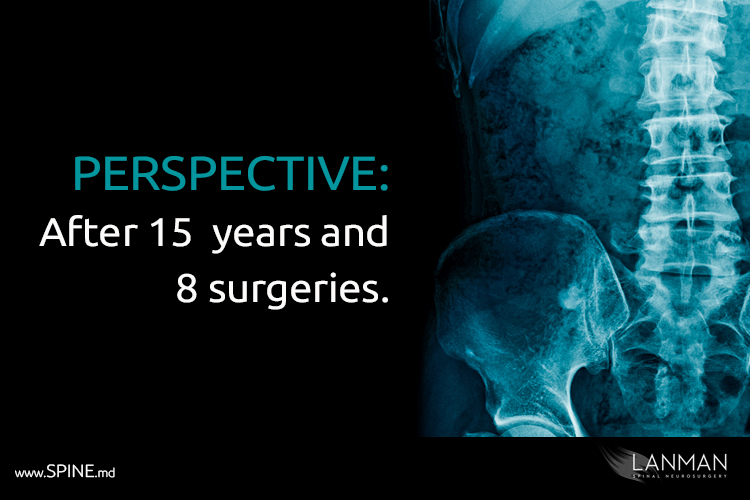My personal perspective as a patient and a neurosurgeon: 15 years and eight back and neck surgeries later.
A patient told me how she found me. She had already received several recommendations for her chronic neck pain. But she couldn’t decide which she was more afraid of surgery or the prospects of living with chronic neck pain.
Finally, a friend of hers told her about “a doctor he knows” who had undergone many of the surgical procedures that he prescribes. That doctor happened to be me.
My patient contacted me and one of the first things she asked, “was the story true?” My full treatment story surprises everyone. It includes fifteen years and eight neck and back surgeries. I’ve had several discectomies, bone spurs removed, plus five artificial discs and two fusions.
She asked me if I ever worried about experiencing so many surgical procedures. My response: there is no bargaining for my mobility and quality of life. No negotiating and no hesitation.
After that, my patient overcame her initial fear. She underwent a double artificial cervical disc replacement and has been happier and pain-free for two years. I only wish I could bring that realization to more people.
In sports and most other things in life, there’s a cost when we hesitate due to our fear of the unknown. Not only do we lose our initiative, but we also lose our perspective. We forget core values and push back our goals. Where our spine health is concerned, delayed surgery means deferred relief from the painful symptoms of degenerative and herniated discs. But it can also mean limiting our treatment options because our situation will get worse over time.
You can’t teach “perspective” in med school. Most doctors are limited by the experience of treatment, by clinical studies, medical research, and by what our patients tell us. Rarely does a doctor know exactly what it’s like to experience surgery. Few of us understand postoperative recovery and the challenge of following all those rules on the treatment sheet. That is unless we actually have personal experience of undergoing the very procedures and therapies we prescribe.
That’s one of the reasons I can connect with many of my patients. I’m fearless about my own treatment. The fact is, my spine is in terrible condition. Through my education and training, I know what my options are. Every little twinge of pain along my spine tells me something. But I can’t communicate symptoms unless the patient already has the experience. So I communicate something else by my honesty and openness about my experience as a patient.
In a deep and personal way, the patients whom I connect with experience their back and neck surgery with me. I know what it’s like to go home as a recovering patient and deal with postop pain and discomfort. When I explain the recovery process, my patients know that I’m not just reading from a doctor’s script: I am speaking from a universal perspective as a patient.
I’m not entirely at the level of talking to my patients as a patient. My primary concern is caring for patients as a doctor at my private practice in Beverly Hills, CA and as an associate professor at UCLA Department of Neurosurgery and faculty at Cedar-Sinai Medical Center in Los Angeles. And what my patients expect is that I’m using ALL of my experience to give them the best possible treatment options. However, I find great success in speaking from experience what surgery is like, and how THEY will see the best possible outcome well after the surgery.
Education and training have taught me that the process of “getting better” is through robust diagnosis and firm understanding of treatment options. My perspective as a patient demonstrates that the process is far more efficient when I prove to my patients what it takes to be “Greater than Better.”






